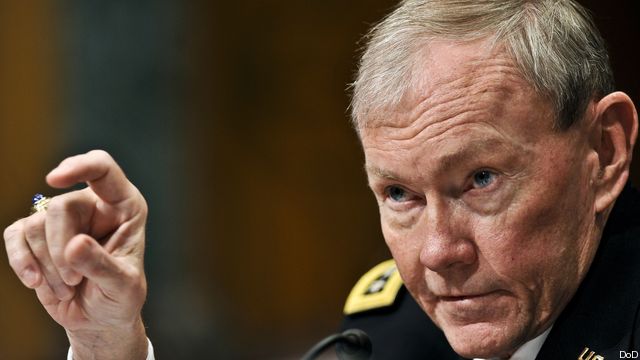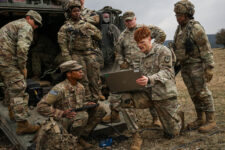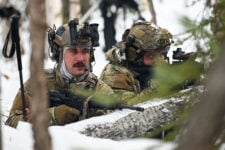
WASHINGTON: He may come to regret it, but Gen. Martin Dempsey today offered what may come to define his tenure as the president’s top military advisor, a doctrine that the United States should never send the military to war by itself.
Here’s the phrase Dempsey uttered: “The military instrument should never be wielded alone.” Before that, answering a question from veteran newsman Marvin Kalb, now with the Brookings Institution, Dempsey offered this as his first, inchoate stab at a doctrine: “I would say where we’re headed is a global networked approach to war.”
The disastrous lack of planning at the interagency level to deal with the aftereffects of the U.S. invasion of Iraq clearly shaped the view of this Army general who cut his command teeth leading the Multinational Brigade Baghdad. It was charged with helping to rebuild the Iraqi army and generally bring some order and peace to the country, made clear his experience their shaped his views on the use of force.
The armed forces must be networked with the rest of the government, especially the State Department, intelligence agencies, the FBI and the Justice Department to be effective, Dempsey said at the Carnegie Endowment for International Peace. He didn’t mention the Agriculture Department, but the general could have. Its experts have provided important advice and assistance to farmers in Afghanistan and other war zones.
He told the overflow crowd of several hundred that he had never met a State Department official until he hit lieutenant colonel — after 22 years of service. “Today, you can’t find a lieutenant who hasn’t been paired with State or Justice or any of a dozen other organizations,” he said. Those personal relationships are and will be key to U.S. effectiveness, he believes.
Now that our two wars are winding down, one of the key questions will be how to maintain those relationships over time, Dempsey said, and to ensure that new troops can make the same kinds of contacts without a war to drive them.
One of the most interesting aspects of the Dempsey Doctrine will be how the White House, the intelligence agencies, the State Department and the Pentagon will institutionalize and make useful the “network” that Dempsey spoke about. Currently, we have a pool of senior leaders who have worked together, but they will be gone in a few years, taking their relationships and experience with them.
One of the toughest nuts to crack will be finally breaking down the Cold War processes and institutions that can make it difficult for agencies and individuals to work together. In particular, Dempey said, although the intelligence agencies have gotten much better at sharing intelligence with other governments, they are really bound by “Cold War processes that have to be adapated to doing what we’re doing today.”
Norway’s top officer on his ‘biggest challenge,’ next frigate and new NATO neighbors
Gen. Eirik Kristoffersen, Norway’s Chief of Defense, talks to Breaking Defense about his plans for spending on new frigates and subs, the challenges of upgrading Norway’s “digital backbone” and refilling the military’s stocks.



























